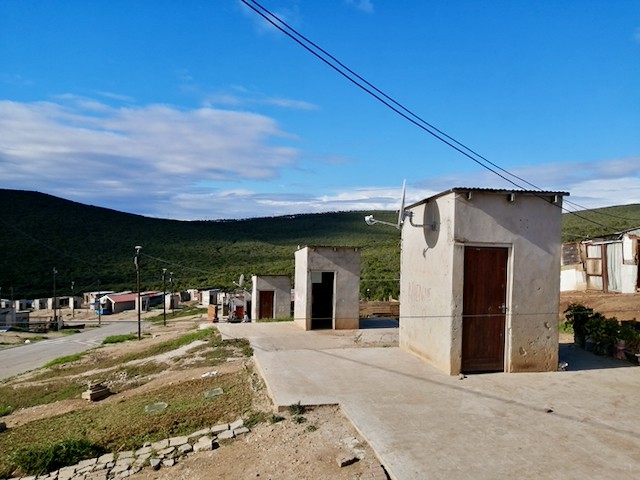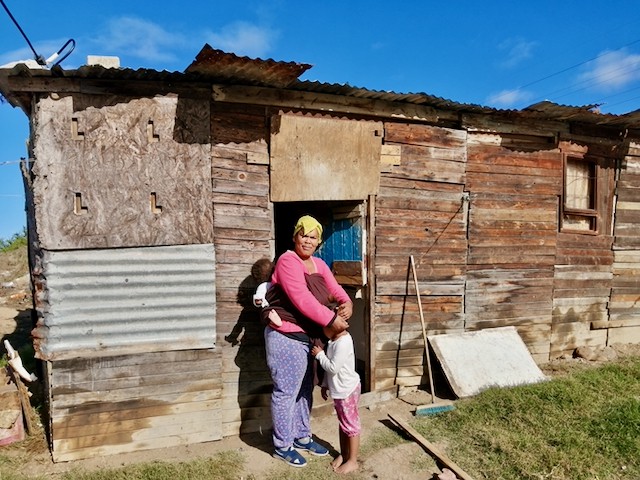Failed RDP project leaves 71 households with toilet buildings but no houses
Eastern Cape government departments pass the buck and kill the project in bureaucracy
Some of the sites for RDP houses for Moevalley residents in Despatch, Nelson Mandela Bay, left incomplete since 2018. Photos: Mkhuseli Sizani
- Seventy-one of the families who were to be housed in the Moevalley project in Despatch have toilets but no houses.
- Only 129 of 200 RDP houses were built. For the others, toilets were built but left unconnected to water or sewage.
- The project came to a halt in 2018 when a request for additional funding was made to build retaining walls to stop erosion and the flooding of foundations being built.
- Neither the implementing agent COEGA, the Eastern Cape Treasury, the provincial Department of Human Settlements and the Nelson Mandela Bay Municipality are providing the funds needed to finish the project.
A project to eradicate the bucket system and build RDP houses for Moevalley families in Despatch, Nelson Mandela Bay, has been left incomplete since 2018. Only 129 of the planned 200 houses were built. Toilets were built for the other 71 but have not been connected to water or sanitation.
When people from Kriekvalley, Reservoir Hill and Mbamba place were relocated to the area without bulk infrastructure for water and sewage, the Democratic Alliance took the municipality to the South Human Rights Commission (SAHRC) to force it to provide residents with water and flush toilets.
The Eastern Cape Treasury stepped in and funded the project. The municipality appointed Coega Development Corporation (CDC) as the implementing agent.
Community leader Fundile Gilili said, “People were relocated in 2013 from Ward 52, which is dominantly DA supporters, to Moevalley in ward 41, which is dominated by the ANC.”
“Residents complained about the lack of water and sanitation … They were relieving themselves in bushes and also had to walk long distances to fetch water. The DA took the ANC-led municipality to SAHRC over these living conditions.”
“The municipality decided to build RDP foundations with flush toilets first, so that when the funds to build the RDP houses became available, the project wouldn’t be delayed,” said Gilili.
Yolanda Classen, a ward committee member and one of the affected beneficiaries, said construction started in 2017 but then stopped in 2018 after some families complained that soil erosion caused by rain had affected the foundations of the houses.
“We then informed CDC about this problem. CDC said it would take our complaints to the municipality and see what could be done about it. Instead of finding a solution, the project suddenly stopped and the contractors left the site.”
Classen has a toilet but no house. “I had to fight for months with the officials in order to get drinking water and my toilet to flush.”
She said neither ward councillors nor municipal officials would take responsibility for the failed project. “Instead our complaints are viewed as if we are politically motivated by ANC and DA … But this has nothing to do with politics. All we want is to get the houses we were promised,” said Classen.
Pumelele Godongwana, provincial treasury spokesperson, said the treasury was not responsible for the failure of the project. “This was one of our special projects at that time. We were only helping the struggling departments with funds to speed up service delivery,” she said.
Dr Ayanda Vilakazi, spokesperson for the CDC, refused to comment and directed all questions to the municipality.
Masixole Zinto, Mayco Member for Human Settlements, said the problem was that funding for retaining walls to stop the erosion had been refused by the province. He said the municipality would submit an application to the provincial human settlements department.
Yanga Funani, the provincial Human Settlements spokesperson, directed all our questions back to the municipality. But Funani did say, “The project was implemented by the municipality and CDC. The project forms part of provincial Treasury initiatives towards bucket eradication to the municipality … The money went straight to the municipality and that is how we were bypassed.”
Christina Fredericks, her husband and five children have been waiting for years for their RDP house in Moevalley, Despatch. She said the project has left them without a functioning toilet. “Even for drinking water we rely on neighbours. At night we relieve ourselves in an empty paint bucket and keep it in the corner in this two-room shack. The stink is unbearable, but we have no choice,” she said.
Support independent journalism
Donate using Payfast

Next: Murder charges dropped against activists after six months in prison
Previous: “I don’t want to sit in this hellish country any more”
© 2021 GroundUp. This article is licensed under a Creative Commons Attribution-NoDerivatives 4.0 International License.
You may republish this article, so long as you credit the authors and GroundUp, and do not change the text. Please include a link back to the original article.
We put an invisible pixel in the article so that we can count traffic to republishers. All analytics tools are solely on our servers. We do not give our logs to any third party. Logs are deleted after two weeks. We do not use any IP address identifying information except to count regional traffic. We are solely interested in counting hits, not tracking users. If you republish, please do not delete the invisible pixel.


